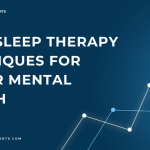Table of Contents
- Understanding the Link Between Sleep and Anxiety
- 1. Establish a Consistent Sleep Schedule
- 2. Create a Relaxing Bedtime Routine
- 3. Optimize Your Sleep Environment
- 4. Limit Screen Time Before Bed
- 5. Incorporate Relaxation Techniques
- FAQs
- Conclusion
Understanding the Link Between Sleep and Anxiety
Before diving into effective strategies for improving sleep and reducing anxiety, it’s essential to understand the connection between the two. Anxiety can manifest as racing thoughts, restlessness, and physical symptoms that disrupt sleep patterns. Conversely, lack of sleep can exacerbate anxiety, creating a vicious cycle.
Research indicates that poor sleep quality can significantly elevate anxiety levels, making it crucial to prioritize restful nights. According to the American Psychological Association, about 40% of adults report that stress and anxiety affect their sleep quality.
By employing effective sleep strategies, you can break this cycle and enhance both your mental and emotional well-being.
1. Establish a Consistent Sleep Schedule
One of the most effective ways to improve sleep quality is to maintain a consistent sleep schedule. This means going to bed and waking up at the same time every day, even on weekends. A regular sleep schedule helps regulate your body’s internal clock, making it easier to fall asleep and wake up naturally.
Benefits of a Consistent Schedule
- Improved Sleep Quality: Regularity helps reinforce your body’s natural sleep-wake cycle.
- Reduced Anxiety: Knowing what to expect can alleviate anxiety about sleep.
- Enhanced Mood: Consistent sleep patterns contribute to overall better emotional health.
Tip: Use a sleep journal or a smartphone app to track your sleep patterns and make adjustments as needed.
2. Create a Relaxing Bedtime Routine
Establishing a calming bedtime routine signals your body that it’s time to wind down. Engaging in relaxing activities before bed can significantly reduce anxiety and prepare you for a good night’s sleep.
Ideas for a Relaxing Routine:
| Activity | Duration |
|---|---|
| Reading a book | 30 mins |
| Gentle yoga or stretches | 15 mins |
| Deep breathing exercises | 10 mins |
| Warm bath | 20 mins |
| Journaling | 15 mins |
Benefits of a Relaxing Routine:
- Mental Preparation: Helps clear your mind of stressors.
- Physical Relaxation: Lowers heart rate and encourages muscle relaxation.
- Sleep Readiness: Signals to your body that it’s time for rest.
Recommendation: Try to limit stimulating activities, such as intense workouts or work-related tasks, in the hour leading up to bedtime.
3. Optimize Your Sleep Environment
Your sleep environment plays a critical role in how well you sleep. An optimized bedroom can create a sanctuary that promotes relaxation and restful sleep.
Key Elements of Sleep Optimization:
- Comfortable Bedding: Invest in a good mattress and high-quality pillows.
- Darkness: Use blackout curtains to block out light, or consider a sleep mask.
- Temperature Control: Keep your room cool, ideally between 60-67°F (15-19°C).
- Noise Management: Consider white noise machines or earplugs if you’re in a noisy area.
The Impact of a Good Sleep Environment:
- Enhanced Sleep Quality: A comfortable, quiet, and dark space promotes deeper sleep.
- Reduced Anxiety: An inviting environment can help ease worries about sleep.
For more tips on creating an ideal sleep environment, check out this resource from the National Sleep Foundation.
4. Limit Screen Time Before Bed
In our digital age, screens are ubiquitous, but they can significantly impair sleep quality. The blue light emitted by phones, tablets, and computers interferes with melatonin production, which is vital for sleep.
Recommendations for Reducing Screen Time:
- Set a Digital Curfew: Aim to put away all screens at least one hour before bed.
- Engage in Non-Screen Activities: Replace screen time with reading, puzzles, or other relaxing activities.
- Use Blue Light Filters: If screen use is unavoidable, consider using apps or settings that reduce blue light exposure.
Benefits of Reducing Screen Time:
- Improved Sleep Onset: Easier to fall asleep without the interference of blue light.
- Reduced Anxiety: Less exposure to potentially anxiety-inducing content, such as news or social media.
5. Incorporate Relaxation Techniques
Incorporating relaxation techniques into your daily routine can significantly reduce anxiety and improve sleep quality. Techniques such as mindfulness, meditation, and progressive muscle relaxation can help calm your mind.
Techniques to Consider:
- Mindfulness Meditation: Focus on your breath and bring your awareness to the present moment.
- Guided Imagery: Visualize a peaceful scene to distract from anxious thoughts.
- Progressive Muscle Relaxation: Tense and then relax each muscle group in your body, starting from your toes and working up to your head.
Benefits of Relaxation Techniques:
- Lowered Stress Levels: Helps manage anxiety effectively.
- Enhanced Sleep Quality: Prepares the mind and body for restful sleep.
For guided meditation resources, check out Headspace or Calm.
FAQs
Q1: How many hours of sleep do I need?
A: Most adults need between 7 to 9 hours of sleep per night. However, individual needs can vary.
Q2: What if I still can’t sleep after trying these strategies?
A: If sleep issues persist, consider consulting a healthcare professional. They can help identify any underlying sleep disorders.
Q3: Can exercise help reduce anxiety and improve sleep?
A: Yes! Regular physical activity can help reduce anxiety levels and improve sleep quality. Aim for at least 30 minutes of moderate exercise most days.
Conclusion
Prioritizing sleep is a vital step in managing anxiety effectively. By establishing a consistent sleep schedule, creating a relaxing bedtime routine, optimizing your sleep environment, limiting screen time, and incorporating relaxation techniques, you can significantly enhance your sleep quality and reduce anxiety levels. Remember, good sleep is not just a luxury; it’s a necessity for your mental health.
Make these strategies a part of your daily life, and watch as your anxiety levels decrease and your overall well-being improves. Sweet dreams!
Also look for:
- For additional insights on how sleep impacts mental health, check out Top 7 Ways Sleep Impacts Your Mental Health Today.
- If you’re interested in exploring the connection between anxiety and emotional well-being, visit 10 Effective Techniques to Manage Anxiety in Daily Life.





